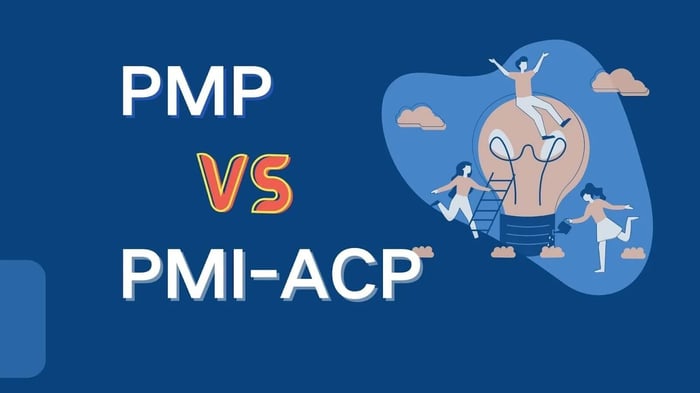Table of Contents
- Why Does It Matter? 🤓
- PMP vs. PMI-ACP: What’s the Difference?
- Differences Between PMP and PMI-ACP Certifications Requirements: What You Need to Know
- The Exam: A Detailed Comparison 📝
- Which One Is Better for Your Career? 🤔
- Pro Tips for Certification Success 🎯
- 10 Lesser-Known Facts You Didn’t Know About Differences Between PMP and PMI-ACP Certifications 🌟
- Conclusion: Why Choose APMIC Certifications 🏅
- FAQs
Ready to dive into the world of project management certifications? If you're thinking of leveling up your career with a prestigious certification, you've likely come across the PMP (Project Management Professional) and PMI-ACP (Agile Certified Practitioner) certifications. But here's the million-dollar question: What are the key differences between PMP and PMI-ACP certifications? 🤔
In the ever-evolving world of project management, choosing the right certification can be a game-changer. The PMP is globally recognized and respected, while the PMI-ACP is your ticket to mastering Agile methodologies. Both certifications are incredible, but they cater to different needs and career paths. Let’s break it down!
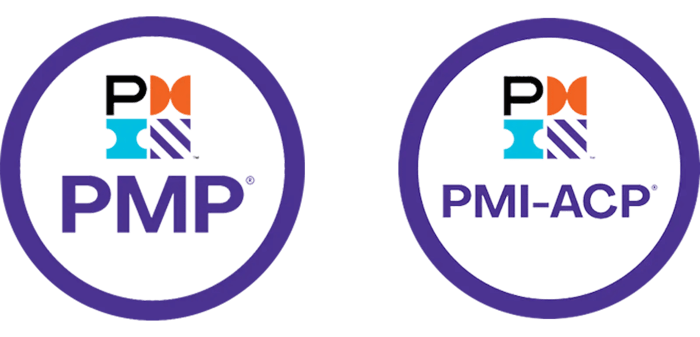
Why Does It Matter? 🤓
Project management is the backbone of every successful organization. With businesses rapidly evolving, the need for skilled professionals who can handle different types of projects is at an all-time high. This is where PMP and PMI-ACP certifications come in—both offering highly respected credentials, but each with its unique focus.
Let’s explore the Differences Between PMP and PMI-ACP Certifications so you can make an informed decision that best fits your career path.
PMP vs. PMI-ACP: What’s the Difference?
This section will provide a clear comparison between the PMP and PMI-ACP certifications, highlighting their core differences in focus, audience, and application.
We’ll look at the key aspects of both certifications to help you understand which one aligns better with your career goals and the type of projects you manage.
PMP Overview 🏆
The Project Management Professional (PMP) certification offered by the Project Management Institute (PMI), is one of the most recognized project management credentials worldwide. It’s designed for those who manage large, complex projects and want to prove their ability to lead and direct projects across various industries.
Key Characteristics of PMP:
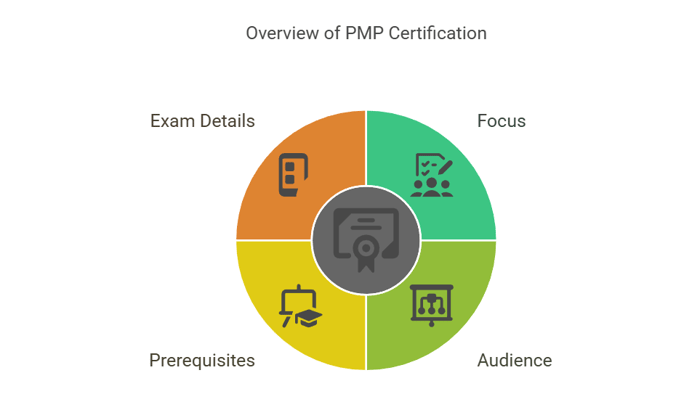
Focus: Traditional project management.
Audience: Project managers with experience in handling large-scale, predictive (waterfall) projects.
Prerequisites:
3-5 years of project management experience.
35 hours of project management education.
Exam: A 200-question multiple-choice exam based on the PMI’s PMBOK (Project Management Body of Knowledge).
PMI-ACP Overview 🚀
The PMI Agile Certified Practitioner (PMI-ACP) certification is also offered by PMI and is geared toward professionals who work with Agile project management methodologies. This certification focuses on agile techniques, which have gained massive popularity in industries like software development, product management, and digital transformation.
Key Characteristics of PMI-ACP:
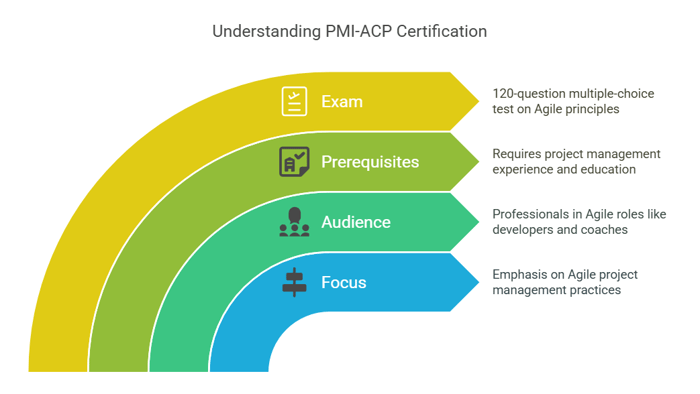
Focus: Agile project management practices.
Audience: Professionals working in Agile environments, including software developers, product owners, and Agile coaches.
Prerequisites:
2 years of general project management experience.
21 hours of Agile project management education.
Exam: A 120-question multiple-choice exam focused on Agile principles.
If you're looking for a deeper dive into the PMI-ACP certification, check out our PMI-ACP Certification Guide for all the details you need to get started.
Differences Between PMP and PMI-ACP Certifications Requirements: What You Need to Know
Understanding the requirements for each certification is crucial. Let’s take a quick look at what each certification demands from you:
Criteria | PMP | PMI-ACP |
Experience | 3-5 years of project management experience | 2 years of general project management experience |
Education | 35 hours of project management education | 21 hours of Agile education |
Exam Format | 200 multiple-choice questions | 120 multiple-choice questions |
Cost (Members) | $405 | $435 |
Cost (Non-Members) | $555 | $495 |
The Exam: A Detailed Comparison 📝
PMP Exam:
The PMP exam is designed to test your knowledge of project management principles as outlined in the PMBOK Guide. It covers the following domains:
Initiating: Defining the project and its goals.
Planning: Developing a detailed roadmap for project execution.
Executing: Coordinating resources and stakeholders.
Monitoring and Controlling: Tracking project performance.
Closing: Finalizing all project-related activities.
PMI-ACP Exam:
The PMI-ACP exam is more focused on Agile methodologies and principles. It tests your knowledge in the following domains:
Agile Principles and Mindset: Understanding Agile philosophies.
Value-Driven Delivery: Delivering high-value results using Agile practices.
Stakeholder Engagement: Managing Agile team collaboration.
Team Performance: Leading and coaching Agile teams.
Adaptive Planning: Managing iterative planning and adjusting to changes.
Which One Is Better for Your Career? 🤔
Choosing between PMP and PMI-ACP depends on your career goals and the projects you work on. Here’s a breakdown to help you decide:
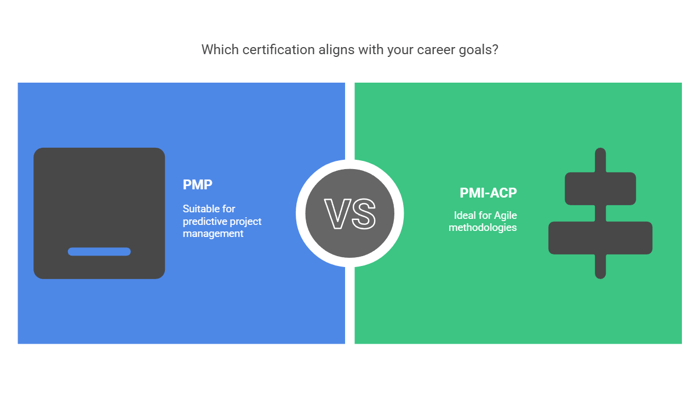
Choose PMP if you work in industries that require predictive (waterfall) project management, such as construction, engineering, or healthcare. PMP is ideal for those managing large-scale projects with clearly defined stages and outcomes.
Choose PMI-ACP if you are working in industries that thrive on Agile methodologies, such as software development, IT, or product management. PMI-ACP is perfect for professionals who need to be flexible and work on iterative, evolving projects.
Pro Tips for Certification Success 🎯
Prepare Early: Start your preparation months in advance to avoid last-minute cramming.
Join Study Groups: Engage with other candidates to discuss concepts and share insights.
Practice Exams: Take practice exams to get a feel for the question format and timing.
Understand Key Concepts: Make sure to deeply understand the core concepts, not just memorize them.
Stay Updated: Project management methodologies evolve, so always keep up with the latest trends and updates.
10 Lesser-Known Facts You Didn’t Know About Differences Between PMP and PMI-ACP Certifications 🌟
Did you know? The PMP exam can be taken in different languages, including Spanish, Portuguese, and Chinese. Source: PMI
Fun fact: The PMI-ACP focuses on seven Agile methodologies, including Scrum and Kanban. Source: PMI
Unique to PMP: PMP-certified professionals earn on average $20,000 more annually than their non-certified peers.
PMI-ACP is considered highly flexible and works well in cross-functional teams. Source: Agile Alliance
Another surprising tidbit: The PMI-ACP exam is considered less stressful due to its focus on Agile practices. Source: PM Training
The PMP certification covers predictive, waterfall project management, which is crucial in construction and engineering.
PMI-ACP is often considered a specialization certification, while PMP is more general. Source: Scrum Alliance
You can combine both certifications for an even more comprehensive skill set.
PMP professionals can switch industries with ease due to the certification’s global recognition.
PMI-ACP often requires ongoing Agile education to maintain certification, unlike the PMP.
Conclusion: Why Choose APMIC Certifications 🏅
If you're seeking a solid project management certification, APMIC offers the best options to give your career the boost it deserves. Whether you’re interested in PMP or Agile methodologies, APMIC’s certifications are designed to cater to all your project management needs. Explore our comprehensive resources and choose the certification path that fits your career aspirations. 💼
For the best project management certification, check out APMIC today! 🌟
FAQs
What is the difference in cost between the PMP and PMI-ACP exams?
The PMP exam costs $405 for PMI members and $555 for non-members, while the PMI-ACP costs $435 for members and $495 for non-members.
Do I need to be Agile certified to take the PMI-ACP exam?
No, but you do need 21 hours of Agile project management education and 2 years of project management experience.
Which certification is more valuable in the IT industry?
The PMI-ACP is highly valued in the IT industry due to its focus on Agile practices.
How long does it take to prepare for the PMP exam?
Preparation time can vary, but most candidates spend 3-6 months preparing for the PMP exam.
Can I take both the PMP and PMI-ACP exams?
Yes, many professionals take both exams to enhance their skills and marketability.
How do I maintain my PMP certification?
You need to earn 60 PDUs (Professional Development Units) every three years to maintain your PMP certification.
What’s the passing rate for the PMP and PMI-ACP exams?
The passing rate for PMP is about 60-70%, while PMI-ACP has a slightly higher pass rate due to its less complex nature.
Is the PMP exam harder than the PMI-ACP exam?
Generally, the PMP exam is considered more difficult due to its focus on broad knowledge of project management, whereas the PMI-ACP focuses on Agile practices.

